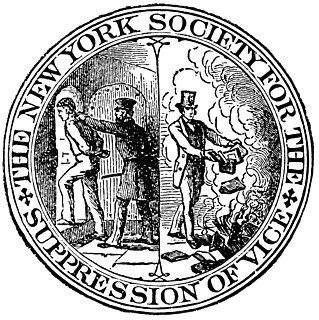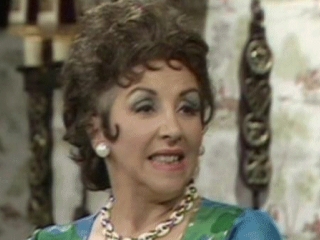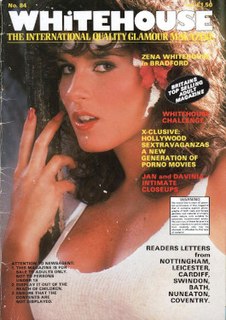Related Research Articles

The Comstock Laws were a set of federal acts passed by the United States Congress under the Grant administration along with related state laws. The "parent" act was passed on March 3, 1873, as the Act for the Suppression of Trade in, and Circulation of, Obscene Literature and Articles of Immoral Use. This Act criminalized any use of the U.S. Postal Service to send any of the following items: obscenity, contraceptives, abortifacients, sex toys, personal letters with any sexual content or information, or any information regarding the above items.
Censorship in the United Kingdom has a history with various stringent and lax laws in place at different times.

R18 is a film or video classification given by the British Board of Film Classification (BBFC). It is intended to provide a classification for works that are within British obscenity laws, but exceed what the BBFC considers acceptable for its 18 certificate. In practice, this means hardcore pornography.
The Committee on Evil Literature was a committee set up by the Irish Free State's Department of Justice in 1926 to look into censorship of printed matter.
In Ireland, the state retains laws that allow for censorship, including specific laws covering films, advertisements, newspapers and magazines, as well as terrorism and pornography. In the early years of the state, censorship was widely enforced, particularly in areas that were perceived to be in contradiction of Roman Catholic dogma, including abortion, sexuality and homosexuality. The church had banned many books and theories for centuries, listed in the Index Librorum Prohibitorum.

The Obscene Publications Act 1959 is an Act of Parliament of the United Kingdom Parliament that significantly reformed the law related to obscenity in England and Wales. Prior to the passage of the Act, the law on publishing obscene materials was governed by the common law case of R v Hicklin, which had no exceptions for artistic merit or the public good. During the 1950s, the Society of Authors formed a committee to recommend reform of the existing law, submitting a draft bill to the Home Office in February 1955. After several failed attempts to push a bill through Parliament, a committee finally succeeded in creating a viable bill, which was introduced to Parliament by Roy Jenkins and given the Royal Assent on 29 July 1959, coming into force on 29 August 1959 as the Obscene Publications Act 1959. With the committee consisting of both censors and reformers, the actual reform of the law was limited, with several extensions to police powers included in the final version.

Mary Ruth Maxted, known professionally as Mary Millington from 1974 onwards, was an English model and pornographic actress. Her appearance in the short softcore film Sex is My Business led to her meeting with magazine publisher David Sullivan, who promoted her widely as a model, and featured her in the softcore comedy Come Play With Me, which ran for a record-breaking four years at the same cinema. However, in her later years she faced depression and pressure from frequent police raids on her sex shop. After a downward spiral of drug addiction, shoplifting and debt, she died at home of an overdose of medications and vodka. She was 33.
The Hicklin test is a legal test for obscenity established by the English case Regina v Hicklin (1868). At issue was the statutory interpretation of the word "obscene" in the Obscene Publications Act 1857, which authorized the destruction of obscene books. The court held that all material tending "to deprave and corrupt those whose minds are open to such immoral influences" was obscene, regardless of its artistic or literary merit.
The Campaign Against Censorship (CAC) is a non-party political pressure group that opposes censorship and promotes freedom of expression in the United Kingdom. The group is based in Fareham, England. It was formerly named the Defence of Literature and the Arts Society (DLAS). It was founded in 1968 with the publisher John Calder as a prime mover behind it as a direct result of the Last Exit to Brooklyn novel publication trial. In 1976 it sent a delegation to see the Home Secretary to argue that "films are subject to unjust discrimination and should be placed on the same legal basis as books and plays as far as content is concerned", and that "the common law offences on indecency should come to an end".
The Censorship of Publications Board is an independent board established by the Censorship of Publications Act, 1929 to examine books and periodicals that are for sale in the Republic of Ireland. It is governed by the Censorship of Publications Acts of 1929, 1946 and 1967. The Board has the authority to prohibit any book or periodical that they find to be obscene. This makes it illegal to buy, sell or distribute that publication in the Republic of Ireland. The Board prohibited a large number of publications in the past, including books by respected authors. However, since the 1990s it does not prohibit publications very often.
The Committee on Obscenity and Film Censorship, better known as the Williams Committee, was a 1970s British Home Office committee chaired by Professor Bernard Williams. The task of the committee was to "review the laws concerning obscenity, indecency and violence in publications, displays and entertainments in England and Wales, except in the field of broadcasting, and to review the arrangements for film censorship in England and Wales".
Censorship in Japan, although prohibited by the country's constitution, is effectively mandated through the Article 175 of the Criminal Code of Japan with regards to obscene material.
Pornography in the United Kingdom is regulated by a variety of laws, regulations, judicial processes, and voluntary schemes. Pornographic material generally has to be assessed by regulators or courts to determine its legality.
An obscenity is any utterance or act that strongly offends the prevalent morality of the time. It is derived from the Latin obscēnus, obscaenus, "boding ill; disgusting; indecent", of uncertain etymology. The word can be used to indicate strong moral repugnance and outrage, in expressions such as "obscene profits" and "the obscenity of war". As a legal term, it usually refers to graphic depictions of people engaged in sexual and excretory activity, and related utterances of profane speech.
The anti-pornography movement in the United Kingdom is a social movement that seeks to reduce the availability of pornography in the country. The movement originates from two distinct perspectives: some feminists oppose pornography because they regard it as a means of degrading women, while some conservatives view it as immoral. The movement has had some influence over legislation, resulting in a number of laws intended to restrict the availability of certain genres of pornography which are legal in a number of other countries. Feminists Against Censorship have described the movement as more concerted and better organised than similar movements in other Western liberal democracies.

R v Peacock was an English Crown Court case that was a test of the Obscene Publications Act 1959. In December 2009, the defendant, a male escort named Michael Peacock, had been charged by the Metropolitan Police for selling hardcore gay pornography that the police believed had the ability to "deprave or corrupt" the viewer, which was illegal under the Obscene Publications Act. He was subsequently acquitted through a trial by jury in January 2012.
David Alec Webb was a British actor and anti-censorship campaigner.
Section 294 of the Indian Penal Code lays down the punishment for obscene acts or words in public. The other sections of Indian Penal code which deal with obscenity are 292 and 293. The law does not clearly define what would constitute an obscene act, but it would enter the domain of the state only when it takes place in a public place to the annoyance of others. Temple art or nakedness of sadhus are traditionally outside the purview of this section.

Pamela Manson was a British actress who in her 30–year career on film, television and stage is best known for playing comedy roles. She was also a political activist who was a member of Equity, and the International Committee for Artists' Freedom, and a committee member of the National Campaign for the Reform of the Obscene Publications Acts.

Whitehouse magazine, also known as Whitehouse International, was a British pornographic magazine originally published by David Sullivan, and later sold to Gold Star Publications. It was first published in 1974. Billed as "The International Quality Glamour Magazine", it was substantially more explicit than its predecessors, showing uncensored images of genitalia.
References
- ↑ "DServe Archive Catalog Show". dscalm.warwick.ac.uk. Retrieved 17 April 2016.
- ↑ Alexander Baron (3 December 2013). "A Brief History Of NCROPA" . Retrieved 25 July 2016.
- ↑ "The Discovery Service". discovery.nationalarchives.gov.uk. The National Archives. Retrieved 17 April 2016.
- 1 2 3 "NCROPA Evidence To The Committee On Obscenity And Film Censorship" (PDF). April 1978. p. 32.
- ↑ Blackburn, Virginia (8 April 2016). "A blue plaque for a blue lady: Risqué film star Mary Millington honoured". Express.co.uk. Retrieved 17 April 2016.